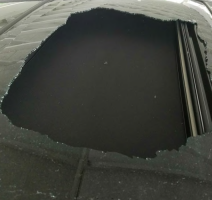
— A Nissan sunroof exploded in 2016 which sent the customer to court, later joined by another Nissan owner who said their sunroof exploded. But after nearly six years in court, the lawsuit has been dismissed for the final time.
The Nissan class action lawsuit was filed by Washington plaintiffs Tamara Lohr and Ravikiran Sindogi, both who allege their Nissan sunroofs exploded.
Plaintiff Lohr leased a new 2015 Nissan Rogue with a panoramic sunroof in August 2015, but in January 2016 her sunroof exploded without warning while she was driving. A Nissan dealership replaced the sunroof.
Plaintiff Sindogi purchased a new 2012 Nissan Murano in February 2013, but in 2016 the panoramic sunroof shattered while driving. The lawsuit alleges glass from the sunroof rained down on Mr. Sindogi, his wife and his daughter.
According to the Nissan class action lawsuit:
"Plaintiffs seek to represent “[a]ll Washington state residents who purchased or leased in the State of Washington a model year 2008-2016 Rogue, Maxima, Sentra, Pathfinder or Altima, 2009-2016 Murano, or 2011-2016 Juke with a factory installed panoramic sunroof.”
The two Nissan owners claim the sunroofs are made with tempered glass instead of laminated glass, the glass is too thin and it's covered in ceramic paint that weakens the glass. The lawsuit also asserts the sunroof glass is attached to the vehicles with too much tension.
Nissan Exploding Sunroof Lawsuit Dismissed
Nissan told the judge the lawsuit should be stopped due to failures of the plaintiffs to adequately plead their case. The automaker says there is no evidence the plaintiffs “were injured at the point of sale” as asserted in the class action.
Additionally, the plaintiffs claim they would have paid less for their vehicles if they had known of the alleged Nissan sunroof defects.
Judge Ricardo S. Martinez agreed with Nissan by saying there is no evidence as to the alleged injury, and the plaintiffs point to no evidence of any medical or other out-of-pocket expenses.
In the case of plaintiff Lohr, the Nissan sunroof was repaired for free and she had no out-of-pocket expenses. She also says she paid nothing for a “loss of use” of the vehicle.
Plaintiff Sindogi did say he had to "pay some amount of money" to repair his Nissan sunroof, but the judge says this is not discussed in any responsive briefing.
Plaintiff Sindogi also eventually traded in his Nissan vehicle and has "conceded in deposition testimony that the trade-in value was not reduced because of the alleged defect."
"Bizarrely, Plaintiffs have not submitted evidence of more traditional forms of injury. There are no medical bills. Plaintiffs apparently had no repair expenses, or they were fully compensated." — Judge Martinez
Nissan also argues the plaintiffs failed to show Nissan knew of the alleged sunroof defects before the plaintiffs received their vehicles in 2013 and 2015, and the judge agreed.
"Plaintiffs have failed to set forth sufficient evidence to support their claim of an unfair or deceptive act by demonstrating that Nissan knew of and failed to disclose a potential defect in their panoramic sunroofs. Dismissal of this claim is therefore warranted." — Judge Martinez
And while the plaintiffs claim the vehicles lost value due to the sunroofs, an expert witness called by Nissan testified an examination of market data, "found no evidence of a price differential due to the alleged defect."
The judge also found warranty claims lacking because the plaintiffs "do not address their warranty claims at all, and thus fail to make a sufficient showing on the essential elements of these claims."
Judge Martinez also said he would have likely dismissed the warranty claims anyway because of the lack of damages noted above.
The judge dismissed all the claims against Nissan "with prejudice," meaning the plaintiffs cannot amend their sunroof lawsuit.
The Nissan exploding sunroof lawsuit was filed in the U.S. District Court for the Western District of Washington (Seattle): Tamara Lohr and Ravikiran Sindogi, v. Nissan North America, Inc, et al.
The plaintiffs are represented by Terrell Marshall Law Group PLLC, Greg Coleman Law PC, Hansen Reynolds Dickinson Crueger LLC, and Wexler Wallace LLP.




